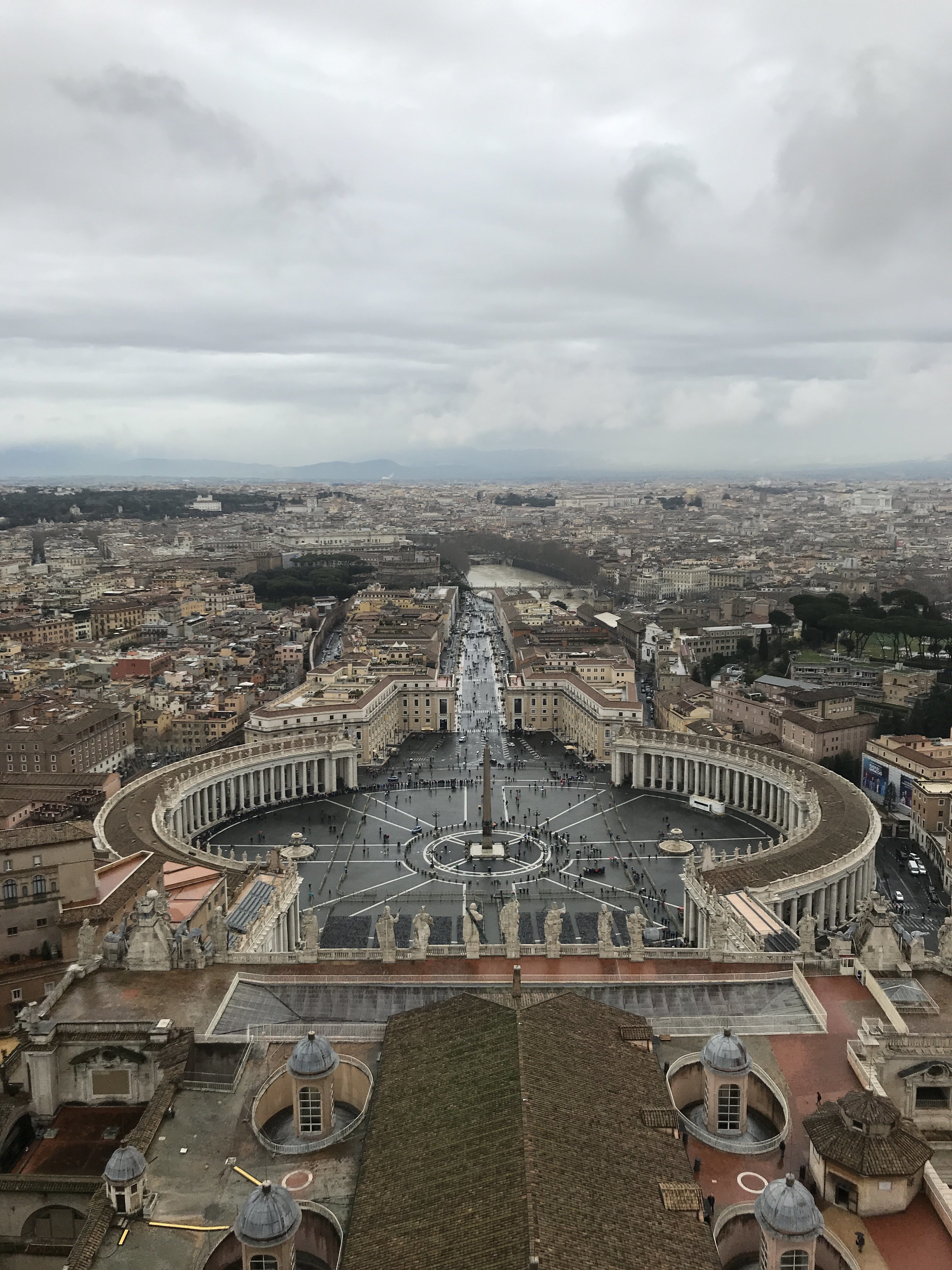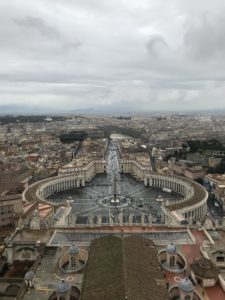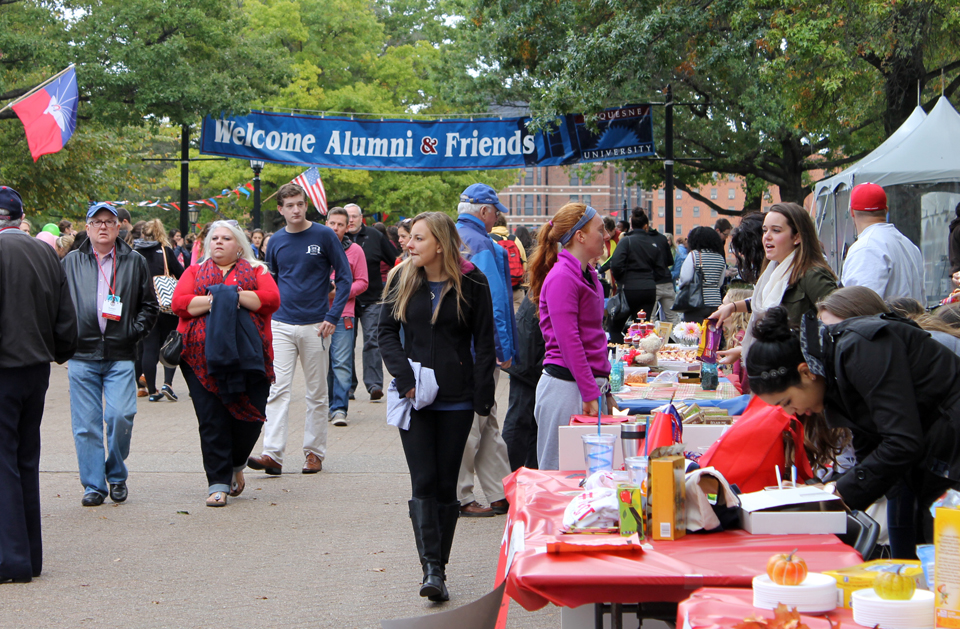

2/28/2019
By Timothy Rush | Staff Columnist
On Feb. 22, the Vatican began a four-day meeting of 190 church leaders to address the ongoing issue of sexual abuse within the Church. The meeting was called “The Protection of Minors in the Church,” with an emphasis on listening to abuse victims and tackling the issue head-on — something that many church officials had hoped for, especially following the Pennsylvania grand jury peport last year.
Preparations began for the meeting on Feb. 18. Church officials spoke at a news conference at the Vatican, with prelates (high-ranking members of the clergy) speaking on how the Church must hold bishops accountable for addressing sexual abuse and further emphasizing that homosexuality was not a cause for the sexual abuse amongst church officials.
Cardinal Blase Cupich of Chicago expressed his hope “that people see this as a turning point,” and that it would be a moment to rally for bishops. In another massive shift toward transparency, the meeting had segments streamed despite it being closed-doors.
In a previous article that I wrote, I went so far as to call out Pope Francis for the inaction that seems to be pervasive throughout the Church, indicting the Catholic Church and calling for people to hold it accountable.
Whether it be from pressure from people inside and outside the Church, or Church leaders finally moved by the pervasive suffering and abuse, they have finally begun to address the matter with the seriousness that it deserves. This is a sentiment echoed by Archbishop Charles Scicluna of Malta, who thanked investigative reporters and the media for bringing the topic “where it belongs”— in the public eye.
Archbishop Scicluna’s words came as a sigh of relief, especially when pressed on the secrecy of the Church. He went so far as to say that “silence is a no-go,” and that complicity, silence and denial would not be tolerated. His position was revealed in his statement “confronting the facts will set us free,” tying a Biblical mission by mirroring John 8:32: “And you will know the truth, and the truth will make you free.” A good sentiment and one that I certainly agree with.
And it gets better. When Vatican spokesperson Alessandro Gisotti declined to answer if Joseph Punderson, another man credibly accused of assault on a minor, remained in the Supreme Tribunal of the Apostolic Signatura by the media, Archbishop Scicluna pressed the question by saying, “The question is a legitimate question and people need to know that what Rome asks of the local churches, it also is ready to apply to Rome.”
Pope Francis himself made headway when he expelled McCarrick over allegations against him, in what is believed to be the first time a cardinal was expelled from the priesthood for sexual abuse. Cardinal Cupich further insisted that Pope Francis calling the meeting was to send a message that sexual abuse in the Church is a top priority for the Pontiff, and that “each one of them has to claim ownership of this problem.” Archbishop Scicluna stated that “[Pope Francis] is ready to say ‘I got that wrong, we’re not going to do it again, or we are going to do it right’.”
There was also mention of sexual abuse of women in the Church, particularly nuns. The prelates in charge of organizing the meeting stated that by addressing the abuse of minors, they would be in a better position to address abuse and protect vulnerable adults in the Church. This was to highlight nuns who had been abused by priests, a massive problem that was only just recently brought to light.
The cries of the abused seem to be ready to be heard. While certainly a better-late-than-never-moment, the issue was finally being addressed in a way that treats it with the seriousness it deserves. This does not mean that we should let up on criticism, however.
I’ll give credit where credit is due, and I will critique and condemn when called for. The Catholic Church is beyond the point of permission; it must make the commitment to fight this. While it looks like it is ready to make that commitment now, it is up to everyone to ensure that it holds itself to that commitment.
When the Church makes mistakes, the people must still be there to call it out. Priests must be ready to confront their colleagues in the Church, and officials must be ready to speak out when mistakes occur. We can see just how Archbishop Scicluna had to urge the Vatican spokesman to answer. Let that be an example to all members of the Church on how to act.
The meeting finished on Sunday, and what should have been a call for change was more of what many have come to expect from the Church: words, with very little substance to back it up, and promises, with very little to show how the Church will live up to these promises.
Pope Francis himself was very abrasive towards abusive priests and the acts of abuse in churches throughout the world. He compared the acts of abuse as “sacrificing human beings, frequently children, in Pagan rites,” and called the priests responsible “tools of the devil.”
Strong words, but it’s nothing we haven’t heard before. We know it’s evil to abuse children, vulnerable women, and anyone else. Pope Francis has already spoken against these, so his harsh words are not really reassuring.
So what was the meeting for if not to take active steps in attacking the problem? It was apparently to help educate bishops and church officials on the seriousness of the problem. That’s good, I suppose. It’s a very serious issue and given the lack of proper responses from church officials, perhaps education on the matter was certainly necessary. There was talk of a handbook to describe the duties of bishops when cases of abuse come up, with an organization of task forces to help them in handling them.
This was done as leaders of the church felt that change within the Church must come from the local bishops themselves. Archbishop Eamon Martin from Ireland made note that the obligation of protecting children must be in the hands of the bishops and that the meeting sent a strong message on what is expected of them in the matter. He stated that as a result of the meeting, the Church is moving closer to adopting a zero tolerance of abuse within churches. His belief in the wide change amongst bishops is shared among many others who were in attendance, and this appears to have been the intended outcome. Cardinal Scicluna himself made note that, “At the end of the day it is the change of heart that is important.”
Cardinal Daniel DiNardo, president of the United States Conference of Catholic Bishops, stated he was satisfied with the meeting. He said, “Now you have the bishops all saying it’s ubiquitous.” While there is little action coming from Rome, Cardinal DiNardo wants to make more headway at home, as the Pope desires. He wants to make resources available to dioceses to aid in ongoing reforms. A noble effort though I would like a more proactive approach.
But the thing is that reform takes time. Time that the Church may not have. As time goes on, more and more cases come out. As reforms are made there is still enough leeway for abuse in the Church to go unnoticed or unreported. It is ubiquitous, and while the Pope wants to optimistically leave it in the hands of the now educated bishops, it may be too late to take on such a slow and nebulous approach.
While I hope that the words of various bishops are not empty and that the words of the Pope are not just more words with no substance, the history of this has left me skeptical. When scandals occur, many church leaders are quick to condemn and talk about how change must happen, but very little is actually done. And when the scandal begins to fade from public consciousness, so too do the condemnations and calls to action from leaders in the Church.
Radical change needs to happen, and it needs to be an ongoing change made publicly. A Nigerian nun spoke at the meeting, condemning church officials for their lack of transparency and silence. While we can say the silence has been broken now with the meeting there must be consistent work done to address this pervasive issue.
And if this is just another case of big talk with no action, then we must be ready to reeducate the bishops. We must never let this problem fade until real change is made, and it is up to all of us to make that happen. It is up to all of us to force them to keep going and to hold them accountable. They’re making promises now and now we must hold them to that.



